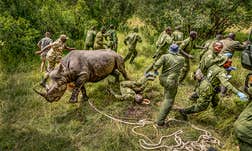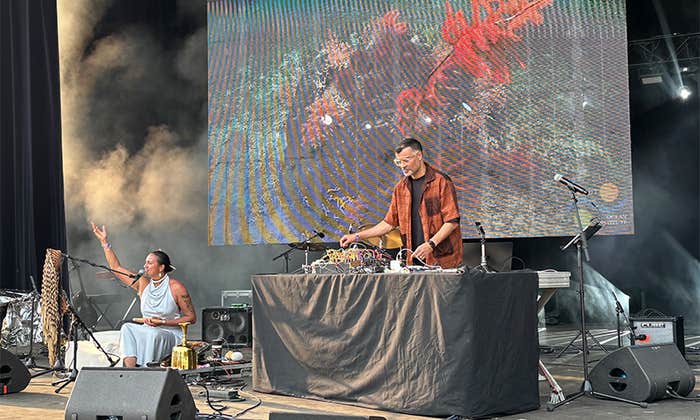Many scientists love to sing the praises of their own specialties, but few proclaim them with the confidence of Andrew Dobson, a professor of ecology and evolutionary biology at Princeton University and the director of the University’s Andrew Dobson Lab. To Dobson, biology’s importance outstrips everything from the search for elementary particles to the exploration of the universe. More specifically, he says, the study of biology’s network systems, from food webs to neural networks, represents “our only hope.”
Absent this understanding, Dobson fears, we stand to lose all that is best about life on Earth. In his email signature, he quotes the computer programmer P.J. Plauger: “My definition of an expert in any field is a person who knows enough about what’s really going on to be scared.”
In an affable English accent that belies a cutting humor, Dobson spoke to me on the phone about the uselessness of physics, the importance of pathogens, and the arrogance of human interference in nature.
How can humans manage nature?
Humans have done a crap job managing nature. Nature does a much better job. Our only hope is a massive and rapid understanding of the way the natural systems work.
What would that understanding look like?
It would look like detailed studies of large, intact ecosystems—while we still have them—and the development of next-generation food-web models that allow us to look at the consequences of losing species. Realistic food-web models capture how natural systems respond to different types of perturbations, and produce distributions of abundant species that mimic those seen in the wild. This is the major scientific challenge of this century. All the stuff that physicists and astronomers do is trivial and essentially self-centered and arrogant compared to solving these problems.
It’s appallingly arrogant to think that humans can manage nature given how abysmal a job we do of managing humans.
Why are problems in ecology more important than problems in physics or astronomy?
Those problems can wait forever and humans benefit zero from the solution of them. There’s no benefit to humans at all from Higgs boson or the discovery of all these boring bits of planets. The mathematics of those things, done on a heroic scale, is relatively simple mathematics: It’s one or two boring rocks, they don’t have behavior, don’t have sex, they just fly around and respond to gravity. Trying to understand food webs, which have many different species with different rates of interactions, different birth rates, death rates, is a much harder problem. The number of interacting types of things is infinitely larger than the things done on a heroic scale in physics. And we desperately need to solve those problems. Physics problems are just for the egos of a handful of physicists. They would do better if they came and worked with us because we have many problems that they would find more exciting to work on.
What are those exciting problems?
Understanding how food webs and similar networks—the immune system, the nervous system, gene regulatory networks—work. They’re all going to have similar underlying mathematical properties. We have to figure out how those work because those are the things on which the quality of life is dependent.
So can this mathematical knowledge help us better manage nature?
It might help us better understand how to minimize interference and create better opportunities for nature to manage itself. But it’s appallingly arrogant to think that humans can manage nature given how abysmal a job we do of managing humans.
What’s an example of abysmal management?
Brexit. Assuming the U.S. is operating as a democracy.
No, sorry, I mean in terms of ecological conservation.
Introducing species as control agents is a history of disasters. Introducing cane toads to control insects in Australia ended in a major disaster. Introducing mongooses to try to control rats is always a disaster. The way that game reserves are run in South Africa—assuming everything has a density, so you just shoot it down to that density—is an appallingly bad, arrogant way to manage biological diversity.
There’s no benefit to humans at all from Higgs boson or the discovery of all these boring bits of planets.
What about the success of wolf reintroduction in Yellowstone?
I think that’s very helpful. Putting the pieces back together is a really vital thing to do. Yellowstone was one of the least disturbed systems in the U.S. There were just one or two things missing. So putting back the top trophic layer, which was conspicuously missing, was a relatively obvious and sensible thing to do. We also learned a huge amount about how the Yellowstone system works by putting the wolves back.
When you’re looking at reviving an ecosystem, what exactly is it that you’re looking for?
A complete set of everything that was there 500 years ago.
Ecologists in New York City are creating a park and new ecosystem on what was once a huge landfill site on Staten Island. Do you think recreating an ecosystem is possible?
It’s very hard categorically to build a healthy ecosystem based on a heap of garbage. It’s almost as bonkers as these ideas of bringing back mammoths from their DNA and reintroducing them. That’s a deeply silly waste of time.
So it’s a complete waste of time to try to build a park on landfill?
Not a park, but an ecosystem. It’s at best a very weak pastiche of the natural system. It’ll have whatever trees you planted, and whatever sort of relatively common birds, and you’ll get the odd rare bird coming through on the bird migration, and you’ll get insects eventually colonizing it, parasites eventually colonizing it. But putting an ecosystem back together could take you decades. As it’s not the natural ecosystem of that area, the natural vegetation may be hundreds of miles away.
Are there places where you think ecosystems are being well managed?
Yellowstone, the Serengeti, big parts of the Amazon, and the Arctic, if it weren’t for climate change.
In those places, what is the unifying factor that you approve of?
Minimal human disturbance.
What constitutes a healthy balance in nature?
“Healthy” is a misnomer. All populations have birth rates and death rates, and all communities are assemblages of species with birth and death rates. For any population to settle down at some relatively stable level of abundance, either the birth rates have to decrease as abundance increases, or the death rates increase. Now it could be that birthrates decrease because food resources become limiting. That suggests interaction between species and their food, and that’s relatively straightforward.
We now have the increasing realization that in terms of balancing natural ecosystems, pathogens, broadly defined, are likely to be much more important than predators because they are much less likely to be satiated. A predator can only eat so much. They can only eat a certain number of prey a day and so the prey are much more likely to stay in control of predators than they are of their pathogens. So it’s much more likely that pathogens are more important in regulating the abundance of things in nature than predators are.
What makes pathogens so influential?
Everything from the abundance and diversity of tropical forests is driven by local pathogens—from seedlings right up to most free-living animal species. We tend to emphasize predator-prey relationships because they’re much more spectacular to film. But the comparatively real event is that you’re being eaten from the inside out by pathogens all the time. They have much more powerful demographic potential to regulate their host. Being smaller, they can reproduce faster than their host and are therefore much more likely to regulate them. Pathogens are like the physicist’s dark matter. They’re the hidden forces that control the abundance and density of things, or the parts of the universe where we live.
What’s the benefit to humans to understanding ecology?
Having a healthy planet to live on. Clean water, air to breathe. Without biodiversity, this planet doesn’t work. It very quickly becomes a boring place to live.
Madeline Gressel is an assistant editor at Nautilus.


























